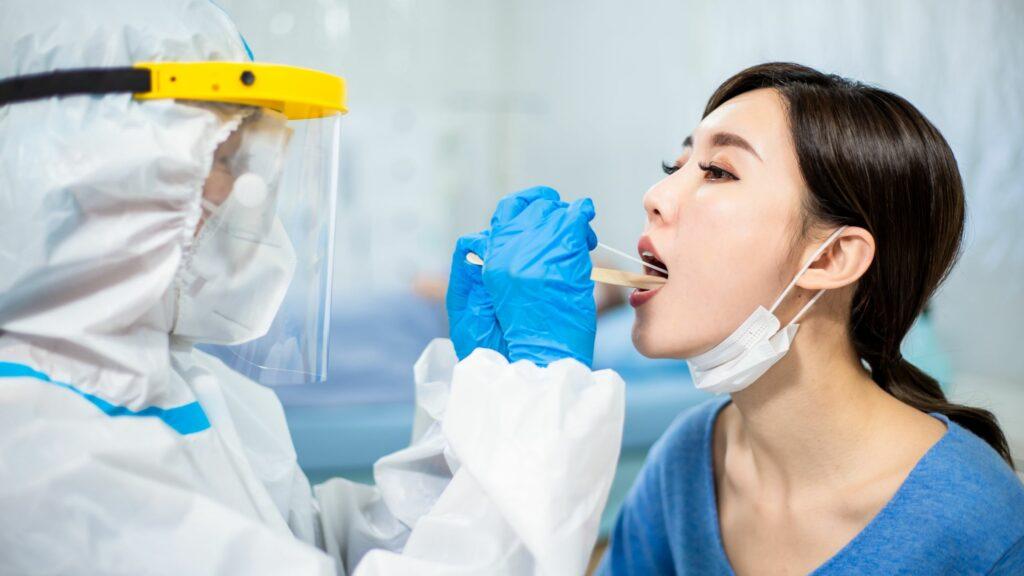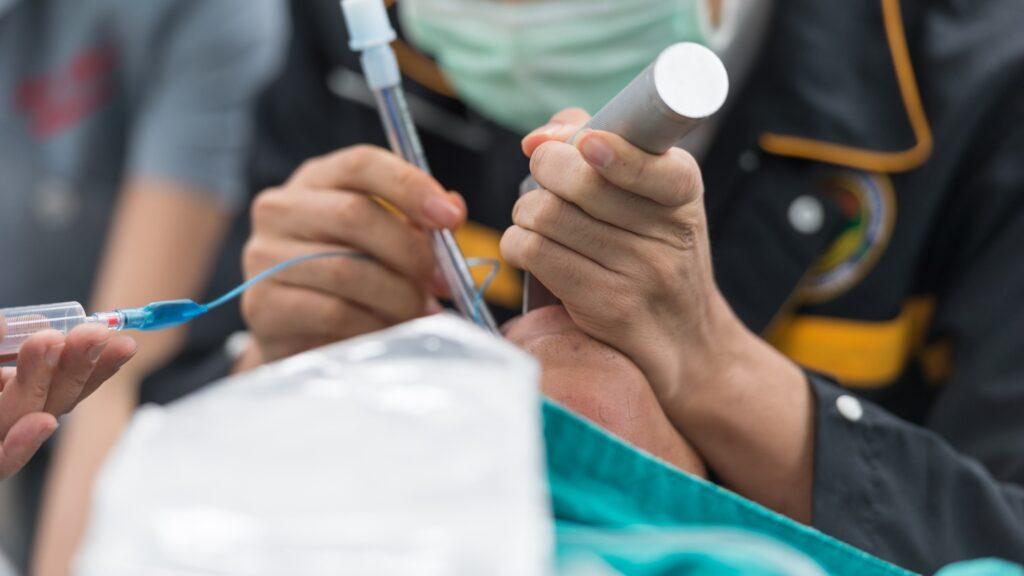Medical swabs have become indispensable in a wide range of diagnostic, sampling, and procedural applications. From the collection of biological samples to ensuring sterile environments, medical swabs have revolutionized the way healthcare professionals approach patient care. In this blog, we embark on a journey to unravel the intricacies of medical swabs. We delve into the different types of swabs available, explore their diverse uses across various medical fields, and uncover the array of benefits they offer. Additionally, we will shed light on Medzell, a groundbreaking B2B platform that is revolutionizing the promotion of Indian medical devices in emerging markets. Join us on this informative journey as we explore the remarkable potential of medical swabs and the innovative solutions offered by Medzell in the realm of healthcare.
Understanding Medical Swabs
Medical swabs are essential tools used in healthcare settings for various purposes. They are designed to collect samples, apply medications, and clean wounds with precision. Understanding the basics of medical swabs is crucial for healthcare professionals and patients alike. Knowing the different types of medical swabs enables healthcare professionals to choose the appropriate swab for specific procedures, ensuring accurate results and patient comfort. It is essential to consider factors like material, size, and sterility when selecting the right swab for a particular application.
Different Types of Medical Swabs
Medical swabs are available in a diverse range of types. These specialized tools are crucial for various applications, including sample collection, diagnostic testing, wound care, and hygiene practices.
- Nasal Swabs: Nasal swabs are commonly used for sample collection from the nasal cavity. They are often utilized in diagnostic procedures, such as testing for respiratory infections or genetic material. Nasal swabs are designed with a slender, flexible shaft and a soft, absorbent tip. The swab is gently inserted into the nostril, allowing for the collection of samples from the nasal mucosa.
- Oral Swabs: Oral swabs are used for various applications in dental and medical settings. These swabs are designed with a soft, sponge-like, or foam tip attached to a handle. Oral swabs are used to collect samples from the mouth, including saliva or oral secretions, for diagnostic purposes. They are also employed for oral hygiene practices, such as applying topical medications or cleaning wounds in the oral cavity. Oral swabs are designed to be gentle on oral tissues, making them comfortable for patients during procedures.
- Wound Swabs: Wound swabs, also known as wound dressing swabs or cotton-tipped applicators, are commonly used in wound care. These swabs feature a cotton or synthetic tip that is highly absorbent, allowing for effective wound cleaning and the application of medications or topical solutions. Wound swabs are available in various sizes to accommodate different wound types and sizes. They are an integral tool in maintaining wound hygiene and facilitating the healing process.
- Vaginal Swabs: Vaginal swabs are specifically designed for a sample collection from the vaginal area. Vaginal swabs are usually made of soft, non-abrasive materials to ensure patient comfort during sample collection. They are an essential tool in gynecological examinations and enable healthcare professionals to gather accurate samples for analysis.
In conclusion, understanding the different types of medical swabs is vital for healthcare professionals to choose the appropriate tool for specific applications. By utilizing the right type of swab, healthcare providers can ensure optimal patient comfort, accurate sample collection, and effective medical procedures.
Applications of Medical Swabs
Medical swabs find applications in various healthcare settings, contributing to accurate diagnoses, treatment, and patient care. Understanding the diverse applications of medical swabs helps healthcare professionals optimize their usage and ensure optimal outcomes. Medical swabs are widely utilized in:
- Wound Care: Medical swabs are used to clean wounds, apply medications, and promote healing. Proper wound swabbing techniques help prevent infections and facilitate the recovery process.
- Sample Collection: Swabs play a crucial role in collecting samples for laboratory analysis. Whether it’s collecting nasal or oral specimens, swabs enable healthcare professionals to obtain accurate samples for diagnostic purposes.
- Microbiological Testing: Swabs are instrumental in microbiological testing, where they are used to collect samples from surfaces, equipment, or patients. These samples help identify potential pathogens and monitor hygiene standards.
- Diagnostic Procedures: Medical swabs are utilized in various diagnostic procedures, such as Pap smears and throat cultures. They aid in detecting infections, abnormal cells, and other medical conditions.
- Dental Care: Oral swabs are frequently used in dental care for various applications, including applying medications, collecting saliva samples, and cleaning hard-to-reach areas.
Understanding the broad range of applications of medical swabs empowers healthcare professionals to utilize them effectively in different clinical scenarios, improving patient outcomes.
Ensuring Product Safety with Sterile Swab Packaging
Proper packaging is crucial for maintaining the sterility and safety of medical swabs. Sterile swab packaging plays a vital role in preventing contamination and ensuring product integrity throughout the supply chain. Sterile swab packaging involves the use of aseptic packaging techniques, sterile barrier systems, and packaging materials that maintain the sterility of the swabs until they are ready for use. This safeguards against microbial contamination and maintains the efficacy of the swabs.
The packaging process for sterile swabs typically includes steps such as:
- Cleanroom Environment: Swabs are packaged in controlled environments to minimize the risk of contamination.
- Sterile Barrier Systems: Swabs are enclosed in sterile barrier systems, such as pouches or blister packs, to maintain their sterility.
- Quality Control: Strict quality control measures are implemented to ensure that the packaging meets regulatory standards and maintains the sterility of the swabs.
By adhering to proper sterile swab packaging practices, manufacturers and healthcare providers can confidently deliver safe and reliable medical swabs to patients, minimizing the risk of infections and promoting overall patient safety.
Best Practices and Guidelines for Quality Assurance in Swabs
Ensuring the quality of medical swabs is paramount in healthcare settings, where accurate test results and patient safety are of utmost importance. Implementing best practices and guidelines for quality assurance in swabs involves a comprehensive approach to maintaining consistent performance, reliability, and safety.
Firstly, selecting and evaluating reputable suppliers is crucial. Thorough supplier assessments help ensure the quality and reliability of swabs by considering factors such as their manufacturing processes, adherence to industry standards, and regulatory compliance. Secondly, robust manufacturing processes are essential for maintaining high-quality swabs. This includes proper equipment calibration, comprehensive personnel training, and adherence to Good Manufacturing Practices (GMP). By following strict guidelines and standards, manufacturers can consistently produce swabs that meet the required quality specifications.
Conducting regular quality control testing is another vital aspect of quality assurance in swabs. This involves performing rigorous tests to verify the swabs’ performance, sterility, and other critical parameters. By closely monitoring the quality control process, manufacturers can identify and address any deviations or issues promptly. Continuous improvement is integral to the quality assurance process. Regular reviews of quality assurance procedures, feedback from healthcare professionals, industry advancements, and customer needs enable manufacturers to identify areas for enhancement and implement necessary improvements.
Swab Validation: Ensuring Reliability and Accuracy
Swab validation is a critical process in the quality assurance of medical swabs. It involves a series of tests and evaluations to ensure that swabs consistently perform reliably and accurately. By validating swabs, healthcare providers can have confidence in the results obtained from diagnostic tests, sample collection, and other medical procedures.
During swab validation, various parameters are assessed to ensure the swabs meet the required performance standards. This includes evaluating factors such as swab material compatibility, sample collection efficiency, and the ability to release collected samples effectively. Additionally, validation processes may involve testing the swabs’ sterility, shelf-life, and durability.
By conducting rigorous validation, manufacturers can identify any potential issues or limitations in swab performance. This allows them to make necessary adjustments, improve product design, and enhance overall swab quality. Ultimately, swab validation helps ensure that healthcare providers can rely on these devices for accurate and consistent results, contributing to effective patient care and diagnosis.
Top Manufacturers of Medical Swabs in India
Swab Sticks Sterilized Plastic
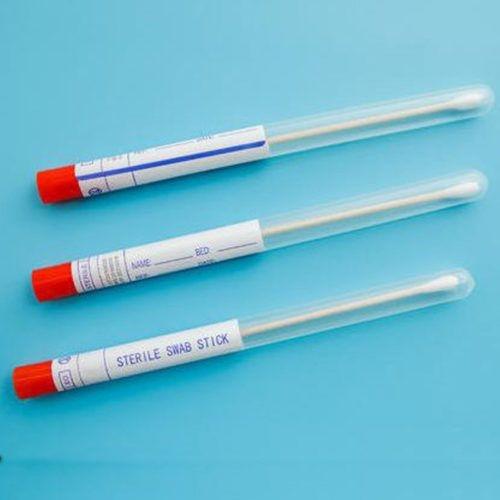 Recombigen Laboratories Pvt. Ltd. presents their Swab Sticks Sterilized Plastic, a top-quality medical swab widely used in hospitals across India. Renowned as a leading manufacturer and global supplier of medical swabs, Recombigen Laboratories ensures the highest levels of reliability and safety in their products. These 6-inch swab sticks are skillfully crafted from a combination of cotton and wood.
Recombigen Laboratories Pvt. Ltd. presents their Swab Sticks Sterilized Plastic, a top-quality medical swab widely used in hospitals across India. Renowned as a leading manufacturer and global supplier of medical swabs, Recombigen Laboratories ensures the highest levels of reliability and safety in their products. These 6-inch swab sticks are skillfully crafted from a combination of cotton and wood.
The cotton swabs boast exceptional quality with a soft and thick tip, ensuring enhanced comfort and effectiveness during usage. The smooth surface of the plastic stick guarantees a seamless swabbing experience. Each swab stick is thoughtfully designed to be the ideal size for various applications, and its pocket-sized form allows for easy portability, making them suitable for emergencies. Inside each pack, you’ll find an ample supply of these high-quality cotton swabs, providing you with a dependable option for cleanliness and overall health maintenance.
Neuswab
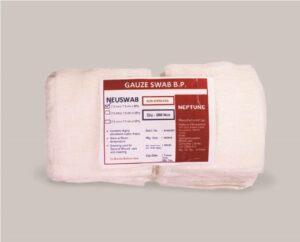 Neuswab, produced by Neptune Orthopaedics, is a versatile type of gauze swab that is manufactured in large quantities. As India’s leading manufacturer and global supplier of medical swabs, Neptune Orthopaedics ensures the highest quality standards for its products. These gauze swabs are made from thin, woven, and breathable fabric. They serve multiple purposes and are commonly used to secure dressings directly over wounds. By keeping the wound clean and allowing air to penetrate, Neuswab aids in the healing process. The swabs are available in both sterile (ETO sterile) and non-sterile forms, catering to different requirements and preferences.
Neuswab, produced by Neptune Orthopaedics, is a versatile type of gauze swab that is manufactured in large quantities. As India’s leading manufacturer and global supplier of medical swabs, Neptune Orthopaedics ensures the highest quality standards for its products. These gauze swabs are made from thin, woven, and breathable fabric. They serve multiple purposes and are commonly used to secure dressings directly over wounds. By keeping the wound clean and allowing air to penetrate, Neuswab aids in the healing process. The swabs are available in both sterile (ETO sterile) and non-sterile forms, catering to different requirements and preferences.
Auro Swab
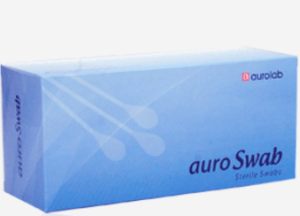 Auro Swab, manufactured by Aurolab, is a cotton medical applicator widely used in various intraoperative procedures, including the retina, orbit, oculoplastic, cornea, and cataract surgeries. Aurolab, being a leading manufacturer and global supplier of medical swabs, ensures the highest quality standards for Auro Swab at an affordable cost. These ready-to-use swabs are ETO sterile and come with a polypropylene swab body. Auro Swab is nonfibrous, preventing the shedding of any particles. The dense cotton head design enhances its performance and ensures efficient sample collection or fluid absorption. The swabs are packed in medical-grade Amcor pouches, ensuring their integrity and sterility.
Auro Swab, manufactured by Aurolab, is a cotton medical applicator widely used in various intraoperative procedures, including the retina, orbit, oculoplastic, cornea, and cataract surgeries. Aurolab, being a leading manufacturer and global supplier of medical swabs, ensures the highest quality standards for Auro Swab at an affordable cost. These ready-to-use swabs are ETO sterile and come with a polypropylene swab body. Auro Swab is nonfibrous, preventing the shedding of any particles. The dense cotton head design enhances its performance and ensures efficient sample collection or fluid absorption. The swabs are packed in medical-grade Amcor pouches, ensuring their integrity and sterility.
X-Ray Detectable Gauze Swab
 Shubham Pharmaceuticals, one of India’s leading manufacturers, suppliers, and exporters of medical swabs, offers the X-Ray Detectable Gauze Swab. This gauze swab is highly regarded for its excellent absorbency and X-ray detection capabilities. The X-Ray Detectable Gauze Swab is made according to medical requirements using high-quality materials sourced from reputable market vendors. Quality control measures, such as visual inspection and weight checks, are employed to ensure accurate bundles. With its exceptional absorbency and X-ray detectability, this gauze swab is a reliable tool in medical procedures where visibility and absorbency are crucial.
Shubham Pharmaceuticals, one of India’s leading manufacturers, suppliers, and exporters of medical swabs, offers the X-Ray Detectable Gauze Swab. This gauze swab is highly regarded for its excellent absorbency and X-ray detection capabilities. The X-Ray Detectable Gauze Swab is made according to medical requirements using high-quality materials sourced from reputable market vendors. Quality control measures, such as visual inspection and weight checks, are employed to ensure accurate bundles. With its exceptional absorbency and X-ray detectability, this gauze swab is a reliable tool in medical procedures where visibility and absorbency are crucial.
ALCOHOL SWAB
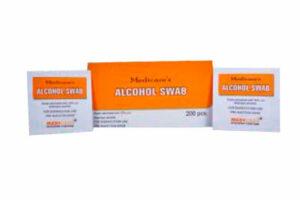 The ALCOHOL SWAB, produced and supplied worldwide by Medicare Hygiene Limited, is a highly reliable medical swab. Specifically designed for pre-injection use, these swabs are thicker and softer, providing superior absorbency and comfort during application. Ensuring the highest standards of hygiene, they are sterile and an essential tool in various medical procedures.
The ALCOHOL SWAB, produced and supplied worldwide by Medicare Hygiene Limited, is a highly reliable medical swab. Specifically designed for pre-injection use, these swabs are thicker and softer, providing superior absorbency and comfort during application. Ensuring the highest standards of hygiene, they are sterile and an essential tool in various medical procedures.
With the ALCOHOL SWAB, healthcare professionals can conveniently and effectively clean the injection site before administering treatment. Its exceptional absorbency ensures optimal cleansing and preparation, making it an indispensable aid in medical settings.
Conclusion
Medical swabs are indispensable tools in healthcare, and understanding their types, applications, and quality assurance processes is vital. With different types of swabs available, healthcare providers can choose the most suitable option for each specific medical procedure. Ensuring product safety through sterile swab packaging and implementing best practices for quality assurance are crucial steps in maintaining the integrity and reliability of swabs.
Swab validation plays a significant role in ensuring the consistency and accuracy of swab performance, instilling confidence in the results obtained. Furthermore, the integration of nanotechnology in swab design and function offers exciting possibilities, including improved sample collection efficiency, enhanced antimicrobial properties, and real-time analysis capabilities. By staying updated with the latest developments and implementing best practices, healthcare professionals can maximize the potential of medical swabs and provide the highest standard of care to their patients.
